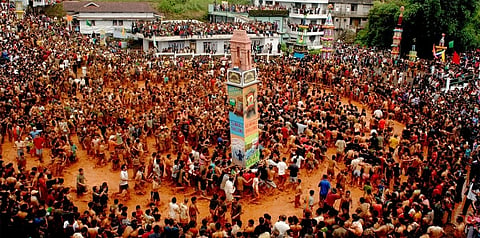
- Destinations
- Experiences
- Stay
- What's new
- Celebrating People
- Responsible Tourism
- CampaignsCampaigns
- SubscribeSubscribe
- Buy NowBuy Now

Meghalaya's festivals are a unique blend of cultural traditions, agricultural significance, and spiritual beliefs. Many festivals celebrate the end of the harvest season, while others mark the beginning of sowing or pay tribute to various deities. These celebrations often feature vibrant traditional dances, music, and rituals that highlight the rich cultural heritage of the state's indigenous tribes, including the Khasi, Jaintia, and Garo communities. One of the most important festivals for the Jaintia people is Behdienkhlam, which plays a significant role in their socio-economic life. This year, the festival in Meghalaya will be celebrated from July 11 to 14, 2025.
The Behdienkhlam festival is a unique cultural event primarily celebrated by the Pnar people of Jaintia Hills in Meghalaya. This festival focuses on seeking divine blessings for a bountiful harvest while also warding off evil spirits and diseases. Held in July, after the sowing season, the festival serves as a prayer for good health, prosperity, and an abundant yield. It includes various rituals aimed at driving away malevolent spirits, making it a significant event in the socio-economic life of the Jaintia community. The Pnar people pray to various deities, like U Mukhai, Mulong, Mooralong, and Musniang, during the festival.
The festival named "Behdienkhlam" translates to "driving away the plague" or "chasing away evil spirits." This four-day celebration features main events in the picturesque town of Jowai, which serves as the district headquarters for West Jaintia Hills in Meghalaya.
The Behdienkhlam festival is deeply rooted in the indigenous Niamtre religion of the Pnar people in Meghalaya. It is a community-wide event, with people from all walks of life participating in the various rituals and celebrations. The festival fosters a sense of unity and strengthens social bonds among the Pnar people. It incorporates various rituals and ceremonies that are central to Niamtre beliefs.
The four-day festival in Meghalaya includes various rituals aimed at driving away evil spirits and seeking blessings for a bountiful harvest. Young men participate by symbolically expelling evil spirits and diseases, using bamboo poles to strike the roofs of houses. On the first day of the festival, animal sacrifices, particularly of pigs, are offered to the deities.
Large, colourful, and artistically designed logs, known as "Rots," are carried in a procession through the neighbourhoods. A game called Dat-lawakor, which resembles football and is played with a wooden ball, symbolises the struggle between good and evil. The Rots are later immersed in the sacred pool of Aitnar, accompanied by traditional dances and music. The Daloi, or chief religious figures, perform rites and make offerings to ancestors and clans. People dress in traditional attire and dance to the rhythms of drums and flutes around Aitnar. The festival culminates in a community feast where attendees share the sacrificial food.
Jowai, the headquarters of the West Jaintia Hills district, is a charming town situated at an elevation of 1,380 metres, approximately 50 kilometres from the Indo-Bangladesh border and 60 kilometres from Shillong. Known for its natural beauty, Jowai is home to the Pnar tribe, which has a matriarchal society. The town offers a tranquil escape with lush landscapes, stunning waterfalls, and ancient megaliths.
Visitors can explore breathtaking waterfalls like Krang Suri and Tyrshi Falls, which provide picturesque views and opportunities for adventure. The Myntdu River surrounds Jowai on three sides, creating scenic backdrops that enhance the town's unique landscape. Additionally, Jowai features several lakes that contribute to its serene atmosphere, while Ialong Park offers a peaceful setting with lush greenery and beautiful scenery.
While in Jowai, don't miss the Nartiang Monoliths—ancient stone structures that are reminders of the region's prehistoric past and provide insights into its history. The town also has a monument dedicated to Kiang Nongbah, a Jaintia freedom fighter, underscoring its historical significance.
In addition to the Behdeinkhlam festival, Jowai is known for the Chad Sukra Festival, celebrated before the sowing season, showcasing the agricultural traditions of the Pnar people. The town is also famous for its handicrafts, including woven textiles, bamboo crafts, and jewelry, offering visitors a chance to support local artisans.
The closest airport to Jowai is Shillong Airport (Umroi Airport), located about 65 km away, but with limited flight options. The more well-connected airport is Lokpriya Gopinath Bordoloi International Airport (Guwahati), approximately 160 km from Jowai. The nearest railway station is Guwahati Railway Station, about 161 km from Jowai.
There are several accommodation options in Jowai, including hotels, guesthouses, and homestays. These options range from OYO Hotel Highwinds Lakeside to GHM Guest House, Ialong Traveller's Nest, and Saral Adventure Resort.
